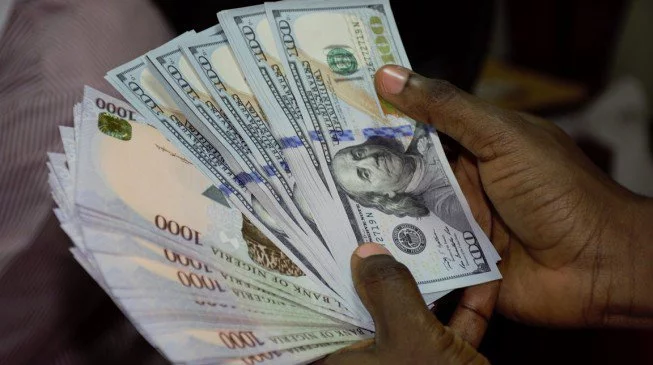The naira, Nigeria‘s currency, has continued to fall across official and unofficial foreign exchange (FX) as speculators scoop dollars amid increased supply.
The local currency opened trading on Friday morning with the dollar selling at N1,430 on the parallel market, popularly called black market. This represents 2.09 percent depreciation against N1,400 quoted on Thursday on the black market.
“Dollar is scarce, very scarce in the market,” one currency trader told the newsmen on Friday.
At the official FX market, known as the Nigerian Autonomous Foreign Exchange Market (NAFEM), the naira closed flat as the dollar was quoted at N1,309.88 on Friday, weaker than N1,308.52 closed on Thursday, according to the data from the FMDQ Securities Exchange.
Dollar supplied by willing buyers and willing sellers increased by 61.02 percent to $318.08 million on Thursday from $197.54 million recorded on Wednesday at NAFEM.
The intraday high closed at N1,435 per dollar, weaker than N1,367 closed on Wednesday. Similarly, the intraday low depreciated to N1,100 on Thursday as against N1,098/$1 closed on Wednesday at NAFEM.
Last week, Olayemi Cardoso, governor of the Central Bank of Nigeria, reflected on the significant challenges encountered during his first six months of assuming office.
He highlighted grappling with inflation and addressing volatility in the foreign exchange market as major hurdles. Cardoso expressed optimism, stating that relative stability has now been achieved, particularly in the FX market, marking a transition from firefighting to strategic planning across key areas.
“We have transitioned from firefighting to strategic planning across key areas,” Cardoso remarked. “This includes improving the ease of doing business in Nigeria and consolidating gains through an efficient and transparent market system.”
Cardoso emphasized the importance of boosting financial and economic inclusion for small businesses and households, exploring smarter use of technology and remote banking to reduce transaction costs and expand accessibility to the financial system.
Highlighting recent developments, Cardoso noted that April witnessed the naira emerging as the best-performing currency globally, buoyed by bullish sentiment from leading international investment institutions. He pointed out robust activities in the FX market, with turnover reaching levels not seen in over seven years, instilling confidence among investors, businesses, and other partners.
Despite the positive trends, Cardoso remained vigilant, acknowledging persistent challenges such as elevated inflation driven by rising food prices, transportation costs, and energy expenses. However, he expressed confidence that inflation, though rising, is doing so at a decelerated rate and will soon begin on a downward trend.
“We remain vigilant in addressing challenges such as elevated inflation,” Cardoso affirmed. “We are confident that with strategic planning and continued efforts, we will overcome these hurdles and sustain economic stability.”
END.

